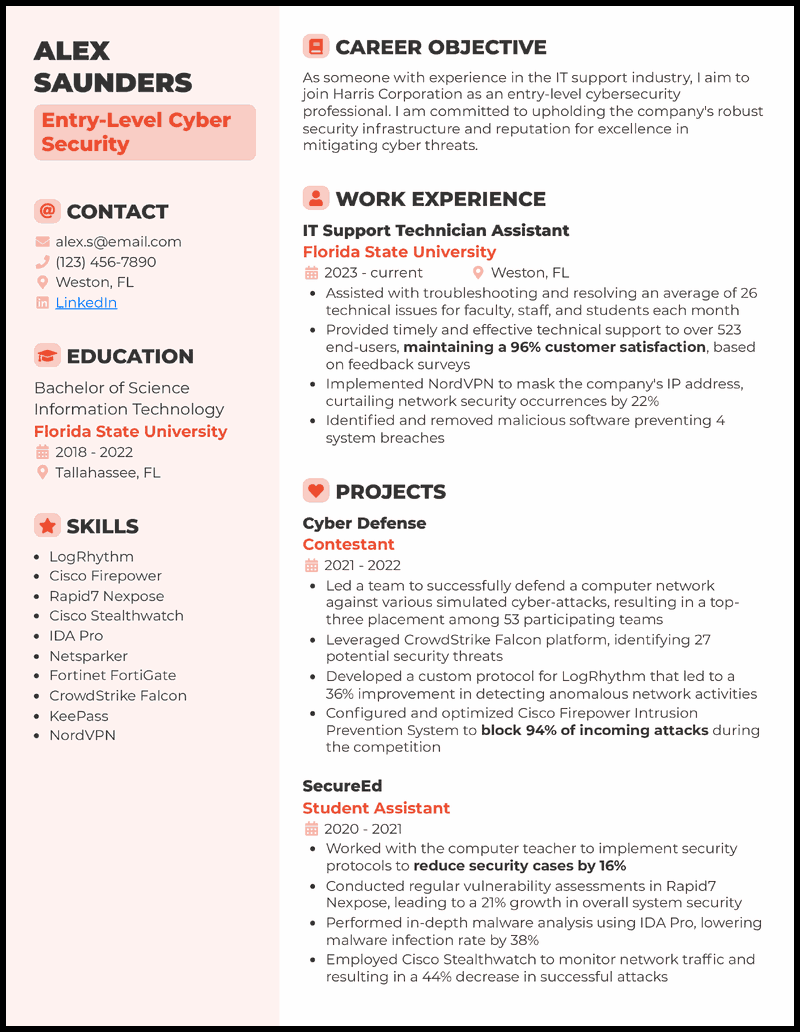As a budding cyber security specialist, you’ve learned to leverage the latest tools and techniques to defend networks and data. With your technical know-how and your analytical approach, you ensure digital spaces are always safeguarded.
Keeping up with ever-changing security protocols and threats is bound to keep you busy. However, to land one of your first jobs, you’ll need an appropriate resume template to help keep your resume just as fresh as your skills.
Our entry-level cyber security resume examples are here to help you with that. With our write my cover letter tips, you’ll impress recruiters and get more interviews!
Why this resume works
- Being a digital warrior isn’t easy. That’s why cyber security jobs can have strict requirements. But no matter how strict, there’s one thing they cannot overlook—metrics.
- Use numbers to your advantage here and highlight how you’ve improved security postures by detecting more anomalies or blocking harmful network attacks. Including or not including metrics in your entry-level cyber security resume will be the difference between you getting hired or overlooked.
Related resume examples
What Matters Most: Your Cyber Security Skills & Background

Thanks to your cyber security training, you’re proficient in various tools that help you defend the digital landscape. From monitoring network traffic with Wireshark to using Aircrack-ng and Snort to sniff out malicious activity, your job skills cover all bases.
Cyber security is a highly advanced line of work that revolves around identifying potential vulnerabilities. As such, it’s best to focus on your technical skills in your resume.
List both the specific tools you use and your areas of cyber security expertise. For instance, talk about things like incident response and vulnerability testing, but also mention the tools that help you thrive in these areas, such as Metasploit and LogRhythm.
9 best entry-level cyber security skills
- Intrusion Detection
- IDA Pro
- Incident Response
- Wireshark
- Malware Analysis
- Cisco Firepower
- Security Auditing
- Nessus
- Metasploit
Sample entry-level cyber security work experience bullet points
Since you’re just starting your career in cyber security, you may feel like you’re a little lacking in work experience. Don’t worry—you have many more talking points than you think.
Try to think back to times when you leveraged the skills you listed earlier in your resume to make a tangible impact, and we don’t just mean full-time jobs here. You could talk about how you used Nmap in conjunction with Snort to scan and monitor network traffic during an internship, or how you used OpenSSL for a college project.
Throw in some metrics where you can for extra impact. For instance, rather than just saying you developed custom scripts in Kali Linux, emphasize how they helped you improve the efficiency of system security checks by 28%.
Here are a few samples:
- Implemented LogRhythm SIEM platform, enabling a 23% speed boost in detecting potential threats
- Configured and optimized Cisco Firepower Intrusion Prevention System to block 94% of incoming attacks during the competition
- Monitored and analyzed network traffic using Wireshark and Snort, mitigating 14% more potential threats than the team’s average
- Automated regular security reporting processes using Splunk, saving 4 hours per week in manual data analysis
Top 5 Tips for Your Entry-Level Cyber Security Resume
- Tailor your resume to each role
- To impress recruiters, only send out resumes that are tailor-made to match each job description. For instance, if a role stresses Kali Linux and Burp Suite, and you’re a pro at these tools, place them at the top of your skills list.
- Highlight your training
- If you have any relevant cyber security certifications or degrees, such as CompTIA Security+ or Certified Ethical Hacker (CEH), draw attention to them in your resume. Certs like these express your continual development in cyber security.
- Show your awareness of emerging threats
- Demonstrate your commitment to keeping up with the ever-evolving world of cyber security. Do this by mentioning any conferences or webinars you’ve attended or articles and books you’ve read to stay informed.
- Emphasize compliance
- Adhering to the latest standards and understanding the regulatory landscape is key in cyber security. Highlight your knowledge and experience with standards like GDPR, HIPAA, or PCI DSS to show recruiters you’re ready to start right away.
- Dive into your digital toolkit
- Rather than just listing areas you’re well-versed in, get into the specific tools and technologies you rely on to get the job done. For instance, instead of just saying you’re proficient in penetration testing, talk about your expertise in using Kali Linux to do so.
As an entry-level cyber security candidate, it’s best to keep your resume short and sweet—make sure you stick to a single-page resume. If you’re having trouble filling up the page, include a tailored resume objective with each application.
While your resume has been focused on your job skills, achievements, and education, your cyber security cover letter can serve as an opportunity to dive deeper into their finer points. For instance, dive into the details of challenges you faced as a cyber security intern helping safeguard Wi-Fi networks.
Highlight instances where you worked effectively in a team or communicated with non-technical stakeholders. Need ideas? You could talk about how you created a more security-conscious company culture by sharing cyber security best practices with the accounting team.










